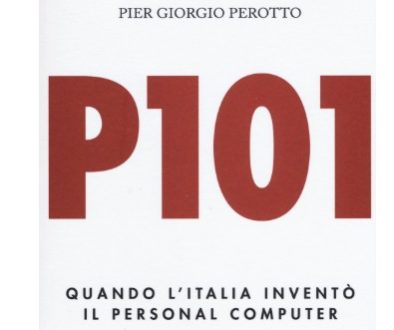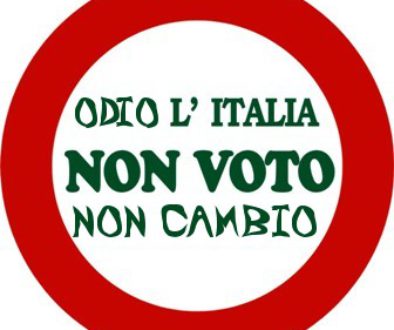public or private water? A logical problem
The comment to the description of the site “for the common good”
The quotation marks are by Monia Benini who published it on the http site://www.perilbenecomune.net/index.php?p=24:6:2:119:422
The parts marked with [..] I took them out because they are not legal
Monia says “the so-called Ronchi decree and its subsequent amendments, or the legislation that the first referendum question proposes to repeal, It was imposed with the official motivation that we had to do it because Europe imposes it on us. [..] According to Alberto Lucarelli, expert jurist and teacher of European public law in the universities of Naples and Paris, “The Member States of the Union and the related local authorities have full freedom to identify the services of general interest and the services of general economic interest that they intend to manage directly, or not on the basis of the principles of competitiveness and competition. Community law recognizes, Moreover, that the management of these two categories of services, in which the water falls within, is done through a public law entity, stranger, therefore, company law rules”
For the uninitiated Lucarelli e’ The extensor of the questions on the water, and it has not “could” participate in a radio and television broadcast to which he had been invited.
Lucarelli does not say an exact thing, as I have widely documented on this http page://www.palmerini.net/blog/2011/06/07/le-norme-europee-impediscono-i-monopoli-la-concorrenza-verra-reintrodotta/
Here I make a summary of what is expressed in detail on that page
Article 14 tfue establishes that “In consideration of the importance of services of general economic interest” which include public services ( and the Union repeatedly affirms the universal right to their access) “Union and Member States [..] they provide that these services work on the basis of principles and conditions, especially economic and financial, that allow them to perform their duties.”
This means that you don't have to have management “economic” and based on plans “financial” which means nothing but sustainable over time.
This effectively prevents any monopoly, Since you get out of economic management.
On the other hand, Lucarelli perhaps did not notice that the "protectionism rules" of public services are prohibited by the article 106 TFUE (Lisbon)
“1. Member States do not issue or maintain, towards public enterprises and companies to which they recognize special or exclusive rights, any measure contrary to the rules of the treaties, especially to those covered by the articles 18 It gives 101 A 109 included.”
The measures to which the article refers are in practice those that establish the European market itself, that is, the very foundations of the Union.
This does not mean that there is no discretion’ Member, especially with respect to the level of services to be guaranteed to every citizen.
But dictate that where possible (and not in the peripheral areas where the state must still perform the service) calls are made for sectors that have economic relevance (therefore all paid services including water, TRANSPORT, trash).
On the other hand, the treaty has that they must “approach” among them all European legislation, and that competition is facilitated, while ensuring the service.
Lucarelli's statement “Community law does not oblige the tender.” does not correspond to reality’ some facts, suffice it to say that for example in Veneto there was a long legal diatribe even on the MOSE , work that is certainly not of normal administration, but since it was possible to make calls, there were several appeals. That the system of European calls for tenders should apply to public services will be’ as soon as Italy is evident in short’ forced to fix a few of the many things that are wrong, from transport, to the aqueducts, to services in general
When Lucarelli states “Therefore a municipality can freely decide to exercise, through a public law entity, these services on the basis of the constitutional principles of their statutes and their regulatory power.” says an incorrect thing, because above these rules e “mandatory” that is superior by the value of the law, there are European treaties, then the directives, then the regulations. With the 1 DECEMBER 2009 The rules of the Council of Europe have also been added over. In fact, the’ European Union is committed to respecting human rights, putting themselves like the States in the Council of Europe (that protects human rights).
What it is instead’ true and’ that municipalities can ACT as service subjects, as long as they do it with society’ owned by them’ that act under market conditions, like other subjects. For example my municipality, along with many others, It owns, E’ socio, of a company’ that, despite the obvious waste resulting from management “Policy” (until today without controls) it works quite well . This company’ For article 23-bis , By the end of the year it should define what are the areas undoubtedly susceptible to the race (therefore not peripheral and non-profitable ones), continue to manage the non-profitable ones at the expense of the municipalities, while the income part should be banned, that is, managed according to a precise contract but decided by the same politicians to whom the entire management is responsible for today. If at this point the rich company wanted to participate in the call for tenders, However, it should bring out private individuals, selling quote, for at least the 40%. The criterion is the European one to solve the problem of the conflict of interest by dividing the political choice from the property’ of the executor. It should be noted that that 40% of society’ sold (which in turn would probably be the 30% of the total, then the 40% of the 30%) it would be money collected by the municipalities and reused for other social services, certainly not given to multi-co. I who am a citizen of one of these municipalities could perhaps see a lowering of taxes, and this also thanks to the fact that we citizens have split the Maronis to make the differentiated, turning trash into resource. The referendum does not concern water (that nobody has ever privatized, and will never be able’ to do it), BUT ALL THE SERVICES. This speaks volumes about how the emotional level has been played to deviate the rational aspect of the whole speech.
When Lucarelli says “This is what the Municipality of Paris recently did, thus demonstrating all the artificiality of argument “European requirement” regarding water privatization.” does not say that the odds, of society’ were bought back by the municipality with a bank loan, but that the company’ management is also participated by private individuals, although in that case it is a gigantic group of social cooperatives, user associations and others. In any case, control exists “private” in public affairs.
In addition the company’ service management, while controlled by the municipality (as in the idea of art.23 bis) is a company’ PRIVATE, not a company’ PUBLIC, but deprived of ownership’ PUBLIC. See the company's website in this regard’
http://www.eaudeparis.fr/page/qui-sommes-nous/entreprise/gouvernance?page_id=256
and also the description of the French Wikipedia http://fr.wikipedia.org/wiki/Eau_de_Paris
On the other hand, if the Parisian market was not in competition for the part that can be’ to compete (very little to tell the truth) would run counter to European standards and the principle of reciprocity’ It is no coincidence that also provided for by art.23 bis. Certainly the case of Paris shows that it is possible’ also go for a company management’ with private individuals and then bring out the private sector in favor of individuals “social” but still private.
Having said all this, you can’ very well think ALSO to prohibit any type of private partnership to the management (although prohibited by treaties), but then even more so, all art.23-bis was not to be canceled, because the point 5 clearly states that the property’ of networks e’ PUBLIC , with which it happens that the victory of the Yes’ would put speculators in the first place for the first time’ to buy the network!
The only point 2 This is what allows individuals to participate in management alone. If you wanted to delete this option (in reality’ currently very limited and behind local political choices) he had to aim to cancel only this, leaving the PRINCIPLE OF THE PROPERTY UNCHANGED’ PUBLIC.
I imagine that those who want to maintain complete control of politics even in the management of public services trust the politicians and their historical results (but I in Naples would kick them in the ass, because we talk about water but also of garbage, roads etc.)
But cancel the property’ publish networks to what it leads ?
Put another way, Delete the whole art.23-bis e’ at most’ great absurdity’ for those who want the public network , because the law recognizes it, and delete it, for the referendum mechanism, implies DENIING THE PRINCIPLE. For example it is said “AND” to deny nuclear power, that is, it is said to say yes to say no to the nuclear (abrogative referendum).
Returning to Paris, I am convinced that it is’ made a call for service where possible, otherwise the Veolia that was previously present could not work in Italy as it does: In fact, the Art-23 bis also imposes these constraints and others against multinationals, that maybe someone can’ also want to aggravate , but certainly not by taking away the property’ public network.
Monia Benini continua “The first municipality to identify the private partner for the water management company with a tender was that of Arezzo, with a center left joint, in the late 1990s, thanks to the Galli law of 1994. ”
Here it is, a law overcome by the current, with assignments WITHOUT CONTORLLI where politics ruled al 100% . And which one is’ the logia that wants to erase the current law in favor of their full management ?
Monia says “The result? Skyrocketing rates, very low investments , certain profits for individuals, absolutely marginal role of the public on the main decisions.” . All true, but the political class in the meantime e’ changed? Who has gained among them ?
The idea that state management is always optimal is completely unfounded (precisely Arezzo shows that politicians also lead you to collapse), And also the idea that the market is always a shit is completely unfounded, as the company shows’ entirely private that manages Brescia, even for the garbage that has the most tariffs’ Basse d'Italia.
In the modern world the most criterion’ Just to not be fooled it is not “public versus private” MA “local versus global”.
That is, privatization or nationalization are not a solution if the community’ local allows waste.
Citizens need to DEVELOP CIVIC SENSE, and they start to make the separate one so that they can then claim that things are done well.
Status is not a solution if there is a community’ room that allows waste, and it will be’ the same if it is privatized, but then the tender notice imposed at least partially limits the total waste and bribes.
Monia says “On the other hand, life to the Municipalities (or to consortia of municipalities) it was made rather difficult if we consider the amount of the necessary investments”
Really this is’ true ONLY where there have been inefficient public management. In many areas of the country many municipalities have been alert and have no such problems, on the contrary, they pay even too high salaries to the managers of their municipalized companies (and it would be worse if they had their hands free because everything “public” )
“the use of debt with private credit institutions (and the lethal SWAP sausages) it is increasingly arduous, while the Cassa Depositi e Prestiti, chaired by Franco Bassanini (Lanzillotta husband who deprived Acea), it fails in its statutory task. For what reason? Because today the CDP is also a joint -stock company, whose 70% is held by the Ministry of Economy, while the remainder is divided into 66 banking foundations ,many of which are interested in the water service business). ”
Here is an ideological distortion: people are blamed on the market.
But I would like to point out that the municipalities of the North East have not lived in debt for many years with banks, for all services, about 40% of the annual budget.
That is to say that banks are present in everything, And this precisely because taxes are wasted by thieves and scammers politicians. We trust these?
it is not’ that the referendum aims to put everything in the hands of politicians thrown out of the European standards that impose calls ?
However, I point out that the Municipality of Paris also indebted to the banks to buy the shares that had previously sold and collected the pennies.
“This situation prompted Riccardo Petrella (Author of Il Manifesto dell'Acqua) and former president of the Apulian aqueduct, To say that if the manager's share capital is also public, but investments are financed through loans taken out with banks, Talking about public management of the service is “a mystification”.”
We all agree on this: the municipalities of today have patches in the ass, The economy does not turn for too many waste, young people are hopeless, they will be without pensions, We are disappearing to pay politicians's pensions and therefore to solve all this what we do …… we gave everything in the hands of the politicians who led us to bankruptcy ? We also want to give him c… ?
Monia then makes a list of many politicians implicated in various “management” demonstrating that you can't’ trust.
Then he says some anomalous things about the market ……
But then you explain to me why we say yes to cancel the “property’ PUBLIC NETWORK” ?
I understand the reasons for “common good” and if I were a liberal I would have been silent since the property was canceled’ PUBLIC .
I am not right or left, I just believe that people in self-government, if you can’ kick politicians, does much better than they do.
Monia then says “Then there is a second great target to hit, or the definition of the management of the water service which, Since water is a common good, cannot be considered of economic relevance”
Regardless of the lens that can be shared or not, it is not’ certainly with an abrogative referendum that this is achieved, much less if the property is even canceled’ publishes networks that are’ exactly the opposite.
Instead, a bill had to be thought of, or to the deletion of the single point 2 Dell’Art 23-to.
I don't believe anymore’ to oversights, if Lucarelli has failed on the question, tell him we start again , but it does not let everyone go into the ditch by DELETING THE PROPERTY’ PUBLIC NETWORK
But unfortunately’ I believe that in any case the water to the companies we must make it pay for it, and therefore such economic management actually requires management “European”, that is, without monopoly, and therefore he got stung and wrapped up with the speech.
On the second question I do not enter, but it seems to me that if the former wins and’ the end .
I conclude by saying that YOU MUST NOT VOTE ON THE FIRST QUESTION WHY’ THE REFERENDARY MECHANISM E’ REVERSE
Anyone who wants to understand the true scope of the question can’ read up on the site
http://www.palmerini.net/blog/2011/05/31/referendum-truffa-lacqua-non-e-stata-privatizzata-e-con-il-si-potranno-farlo/





